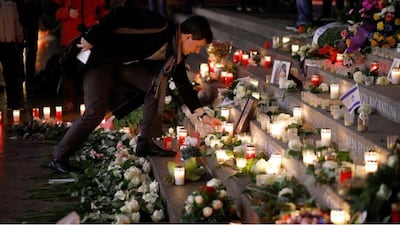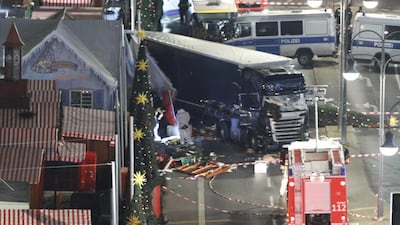A series of security failures allowed a terrorist to slip through the net and carry out the Christmas market attack in Berlin, a final report has found.
Anis Amri killed 12 people in the 2016 attack – shooting a lorry driver and ploughing the vehicle into pedestrians in Germany’s worst extremist attack.
Amri was known to security services more than a year before the attack but authorities believed he was no longer a serious threat.
A 1,200-page report by politicians in Berlin said authorities failed to monitor Amri’s movements at weekends or investigate his potential extremist contacts.
The report also blamed staff shortages and poor co-operation between security services for the failure to thwart the attack.
“We found numerous mistakes and the sum of these mistakes and failures made the attack possible,” said Stephan Lenz, chairman of the inquiry panel.
“There were a number of individual miscalculations, there were structural deficits in the security architecture, there were shortages of staff. All of this together led to Amri not being stopped and being able to carry out the attack.”
Amri arrived in Germany illegally in 2015 and lived under several false names in several German states, including Berlin.
He soon attracted the attention of authorities because of his suspected extremism and involvement in drug dealing.
Police began looking into his beliefs in October 2015 after a neighbour saw pictures of what appeared to be ISIS fighters on his phone.
Investigations revealed he talked about buying Kalashnikov assault rifles in Paris to carry out an attack in Germany.
Amri was placed under observation but this was scaled down by mid-2016 when signs of extremism were thought to be waning.
Investigators believed that someone involved in the drugs trade was unlikely to be a religious extremist, the committee’s report found.
“There was a perception that Amri had cooled off and was not becoming more radical, that he used and sold drugs … that he lived a mundane lifestyle and therefore couldn’t be a radical Islamist,” Mr Lenz said.
“That was a miscalculation, which led to the intensity of observation being scaled down and Amri not being prioritised any more.”
Observation failures
The report said it was hard to understand why Amri was not monitored during the evening, at weekends and at Friday prayers.
He was observed attending a mosque known as Fussilet 33, which was banned subsequently by German authorities.
The committee said investigators failed to properly investigate Amri’s social circle and whether it involved extremist connections.
“Amri’s web of contacts was not sufficiently cleared up. There were more possibilities here,” Mr Lenz said.
“It was clear that Berlin as a capital city would be a focus of Islamic extremists but there was no effective management of potential threats.”

Berlin’s Social Democratic Party, the city government's leading party since 2001, said counterterrorism measures had improved since Amri’s attack.
"The number of counterterror staff has doubled and software upgrades allow for better sharing of data," said party spokesman Frank Zimmerman.
The committee’s four-year investigation heard from dozens of witnesses and examined thousands of pages of documents.
More than 50 people were injured in the attack. The report said there was room for improvement in how the survivors of Amri’s rampage were supported.
Amri, originally from Tunisia, was killed in a shootout with Italian police days after the attack.
After arriving in Europe on Italy's Mediterranean island of Lampedusa in 2011, he served time in a prison on Sicily for various offences.
Italian counterterrorism authorities later said that Amri may have been radicalised at the Sicilian jail.


